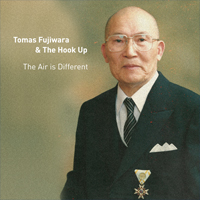482 Music (CD/DL)
Recorded Oct 3, 2011; Released Apr 27, 2012
Personnel:
- Tomas Fujiwara (drums, compositions)
- Trevor Dunn (bass)
- Mary Halvorson (guitar)
- Brian Settles (tenor sax)
- Jonathan Finlayson (trumpet)
Track List
- Lineage, 7:47
- Double Lake, Defined, 3:30
- For Ours, 5:09
- Cosmopolitan (Rediscovery), 6:07
- Smoke-breathing Lights, 10:52
- Postcards, 11:44
Review
A complaint often leveled against modern musicians is that they lack a sense of history. Jazz musicians have often fallen on either side of this dichotomy–either as dedicated practitioners of the tradition as it has been handed down to them or as fierce reformers set on disrupting the well-trodden paths of the past. Of course, some of the most successful figures have managed both–Charles Mingus perhaps most brilliantly. The Air Is Different, the latest release by drummer and composer Tomas Fujiwara, is delicately balanced along this divide between past and present.
This album contains six very personal songs. Most of the tunes reflect upon family or life-long friends–together they represent a thoughtful reflection upon the legacy of the past, history, and how interpersonal relationships continue to impact us in the present moment (even the ultra-present). With the exception of the first piece, the songs on the album are each longer than the one that precedes them and when taken on the whole, each seems to build upon its predecessor in remarkable and interesting ways.
The open piece, dedicated to the memory of Fujiwara’s grandfather, features a nimble Finlayson shifting and flittering over the turbulent and complex sound of the rhythm players and guitar. It is a deeply emotional piece, both mournful and reflective. The second piece is lighter and one of Fujiwara’s catchiest tunes to date. It features a brilliant solo by Halvorson followed by a fun interchange between the horns. The sudden break from melody to structured rhythms gives it a foreboding, but humorous feel–fitting for a song written about Fujiwara’s long-time friend Taylor Ho Bynum.
The third track is a ballad and features the most explorative playing by Settles on the record. Fujiwara’s composition balances this with the more reflective Finlayson and Halvorson, in succession, giving the piece a balanced, organic feel to it. The fourth track presents an immediate shift in mood with Halvorson offering disparate sounds by barely touching her strings, then a complex mix of all the instruments. The song conjures images of movement, a journey, and the interaction of individuals of varied backgrounds–Halvorson, Dunn, and Fujiwara provide texture and even conflict between the moving parts while Finlayson and Settles paint a picture of individuals making their ways through these varied, even foreign landscapes, taking order from disorder. Then, each voice, having established its position, speaks to the others, in turn.
The fifth track features Dunn with an extended opening solo then shifts into an interaction between guitar, bass, and drums. Perhaps the most ambitious composition on the disc, this song is an expose in rhythmic interchange with the trumpet and saxophone offering reprieve from the heaving-lifting performed by the other musicians. Finally, at the 10-minute mark of the song, it breaks into a lazy stroll to conclude the tune. The final song, dedicated to Fujiwara’s mother, is a rolling tribute filled with warm affection, glee, and humor.
This album is a significant contribution from Fujiwara, whose career arc seems to be reaching ever-higher. If you get a chance, go see him perform these songs live … it will be well-worth the price of admission.

